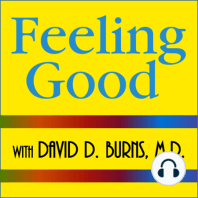84 min listen

358: Ask David - Depression, schizophrenia, and more!
358: Ask David - Depression, schizophrenia, and more!
ratings:
Length:
60 minutes
Released:
Aug 21, 2023
Format:
Podcast episode
Description
Are the "physical" symptoms of depression specific or non-specific? How do you treat schizophrenia with TEAM? Why don’t more shrinks help themselves? Healthy vs unhealthy negative feelings-- what's the difference? Questions answered in this podcast: 1. Laura asks: Why don’t you include the physical symptoms of depression in your assessment tests? 2. Fred asks: How would you use TEAM-CBT to treat individuals with schizophrenia? 3. Author not known: Why don’t the therapists you treat with TEAM treat themselves using self-help techniques? 4. Zach: How does David understand the difference between healthy and unhealthy emotions? Is there any overlap between EFT (Emotionally Focused Therapy) and David’s TEAM-CBT? The following are David’s written responses to these questions. However, in the podcast, Rhonda and David discuss them, and their answers together may differ or enlarge on the material below. Also, in some cases, the written answers contain additional information not included in the live podcast. 1. Laura asks: Why don’t you include the physical symptoms of depression in your assessment tests? Author: Laura asks a question about post #248: “David and Rhonda Answer Your Questions about Exercise, Empathy, Euphoria, Exposure, Psychodynamic Therapy, and more!” Comment: Fabulous, David. Bless you. Have you done a show on assessments? I'll be honest about my confusion. Some of the measures that you have developed almost seem too simple to be accurate. For example, the depression test isn't sensitive to any of the physical manifestations of the illness. Anyway, I was just curious about that. David's Reply Thanks, Laura! Good questions! First, the so-called physical symptoms of depression are non-specific and not uniquely associated with depression. Only the core emotional symptoms are good indicators of depression: feeling down, hopeless, worthless, unmotivated, and not enjoying life. If you want to measure physical symptoms, they won’t give you much information about depression, but at least they need to be worded correctly, which they aren’t in most assessment tols. For example, you can measure weight gain, OR weight loss, in single and separate items, but not in the same item. But if you go to a mall and ask how many people have had weight gain, you’ll probably find that more than 50% report weight gain, but this is rarely due to depression, rather it is due to overeating! Similarly, a significant fraction will say yes to a question about weight loss, and in the vast majority of cases this will be due to dieting, not depression. Similarly with the other poorly thought out physical symptoms, like trouble sleeping. The reliability of my depression measures has typically been .95 or better, as compared with measures like the Beck or PHQ9 that have only .78 to .80 reliability coefficients (called “coefficient alpha.”) I have observed a phenomenal lack of critical thinking behind most current psychological tests for depression, anxiety, and other variables of interest to clinicians and researchers. You also asked about apps for anxiety, like OCD, as opposed to depression. The Feeling Good App causes rapid and significant reductions in, not one, but seven categories of negative feelings, including feelings of depression, anxiety, guilty/shame, inadequacy, loneliness, hopelessness and anger. Thanks so much! Finally, I have to confess my bias toward trying hard to make things simple, so we can all understand what we’re talking about! When things are overly complicated or hard to “get,” I usually feel fairly suspicious about the person who is trying to “teach.” In college I always had the policy that if I can’t understand what the teacher is trying to say, the teacher has a problem! My thinking today is pretty similar! I’ve always appreciated teachers who keep things simple for us mere mortals who appreciate having things explained clearly and in everyday words. Best, david 2. Fred asks: How would you use TEAM-CBT to treat individuals
Released:
Aug 21, 2023
Format:
Podcast episode